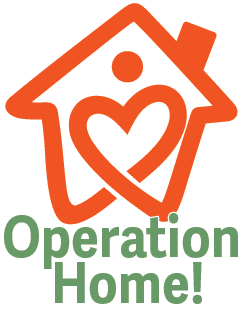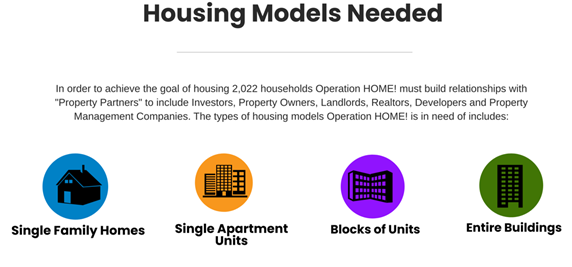Permanent Supportive Housing (PSH)
Permanent Supportive Housing is a combination of housing and services designed for people with more serious mental illnesses or other disabilities who need support to live stably in their communities. These services can include case management, substance abuse or mental health counseling, advocacy, and assistance in locating and maintaining employment. PSH is a proven solution for people who have experienced chronic homelessness as well as other people with disabilities, including people leaving institutional and restrictive settings.
Unit Selection
Participants in PSH programs are assisted in locating a dwelling unit of their choice in the community that meets program eligibility requirements. For the dwelling unit to be eligible in the program, the unit must pass a Housing Quality Standards (HQS) Inspection. Depending on the funding source, the rent for the unit and utilities must be at or below Fair Market Rent (FMR) or reasonable in comparison to other unassisted units similar in location, size, unit type, age, unit amenities and property facilities.
Rental Assistance
Participants in the programs are required to pay at least 30% of their adjusted monthly income towards the cost of rent and utilities. The PSH program calculates the participant’s portion of rent in accordance with applicable program guidelines. The remaining portion of the Contract Rent for the dwelling unit is subsidized by the program and is paid directly to the Landlord. The PSH program participant is the leaseholder and the sole tenant for the dwelling unit. PSH program enters into a contract with the Landlord to provide rental assistance to participants and their authorized family members. Participants are assisted for as long as they remain eligible for the assistance.
Supportive Services
Supportive services in PSH are tailored to meet the individual needs of the household and may include case management, mental health treatment and counseling, substance use treatment, assistance with daily activities, skills training and development, transportation, health education, conflict resolution, crisis response, and assistance with socialization and seeking employment. Services in supportive housing are flexible and primarily focused on the outcome of housing stability. Supportive services are provided by partners in the homelessness and integrated health care fields.
Rapid Rehousing
Rapid Rehousing is an intervention designed to help individuals and families to quickly exit homelessness and return to permanent housing. Rapid Rehousing assistance is offered without preconditions (such as employment, income, absence of criminal record, or sobriety) and the resources and services provided are tailored to the unique needs of the household.
Unit Selection
Participants in Rapid Rehousing programs are assisted in locating a dwelling unit of their choice in the community that meets program eligibility requirements. For the dwelling unit to be eligible in the program, the unit must pass a Housing Quality Standards (HQS) Inspection or habitability inspection. Depending on the funding source, the rent for the unit must also be determined to be reasonable in comparison to other unassisted units similar in location, size, unit type, age, unit amenities and property facilities or at or below Fair Market Rent.
Rental Assistance
Service providers together with participant households determine the amount of rent and utilities that the household can afford monthly and in accordance with applicable program guidelines. The remaining portion of the Contract Rent for the dwelling unit is subsidized by the program and is paid directly to the Landlord. The program participant is the leaseholder and the sole tenant for the dwelling unit. The service provider enters into Rental Assistance Agreements with Landlords to provide rental assistance to program participants and their authorized family members. Participants are assisted for as long as is necessary for them to become financially self-sufficient and able to afford the entire Contract Rent with their own income. On average, Rapid Rehousing assistance lasts approximately 6 months.
Supportive Services
In Rapid Rehousing programs appropriate and time-limited services and supports are provided to individuals and families to allow them to stabilize quickly in permanent housing. Case managers monitor participants’ housing stability and are available to resolve crises. Services are focused on providing or assisting the household with connections to resources that help them improve their safety and well-being and achieve their long-term goals. Services are client-directed, respectful of individuals’ right to self-determination, and voluntary.
Shared Housing
Shared Housing is when two or more unrelated people share a house or apartment. The purpose of the program is for participants to share the costs of permanent housing; essentially to have a roommate. Shared Housing can be done with participants of any tenant-based rental assistance program. The only difference is that participants must have separate leases with the landlord. Unit selection, rental assistance, and case management are all dependent on the program that the participants are enrolled in at lease up.
Mainstream Voucher Program
The Mainstream Program provides rental assistance through Section 8 Housing Choice Vouchers to very low-income, disabled households. The purpose of the program is to expand residential choice for Mainstream households while promoting fair housing, ensuring safe and affordable housing, and encouraging self-sufficiency efforts by participant households. The Mainstream program serves ALL disabled families, regardless of the type of disability. There is no preference provided to families with specific types of disabilities. Also, the Mainstream program does NOT require that applicants be homeless.
HUD-VASH
Unit Selection
Participants in the HUD-VASH program are assisted in locating a dwelling unit of their choice in the community that meets program eligibility requirements. For the dwelling unit to be eligible in the program, the unit must pass a Housing Quality Standards (HQS) Inspection. The rent for the unit must also be determined to be reasonable in comparison to other unassisted units similar in location, size, unit type, age, unit amenities and property facilities.
Rental Assistance
Participants in the programs are required to pay at least 30% of their adjusted monthly income towards the cost of rent and utilities. Southern Nevada Regional Housing Authority (SNRHA) calculates the participant’s portion of rent in accordance with applicable program guidelines. The remaining portion of the Contract Rent for the dwelling unit is subsidized by the program and is paid directly to the Landlord. The program participant is the leaseholder and the sole tenant for the dwelling unit. Participants are assisted for as long as they remain eligible for the assistance.
Veterans Affairs Supportive Services
SNRHA works closely in this program with VA Case Managers and other community-based organizations to support these Veterans in their home.
Supportive Services for Veteran Families
Supportive Services for Veteran Families (SSVF) is a Rapid Rehousing intervention specifically for veteran households. Rental assistance and case management are time limited with the goal of assisting the household in obtaining and maintaining permanent and stable housing.
Unit Selection
Participants in SSVF programs are assisted in locating a dwelling unit of their choice in the community that meets program eligibility requirements. For the dwelling unit to be eligible in the program, the unit must pass a Housing Quality Standards (HQS) Inspection. The rent for the unit must also be determined to be reasonable in comparison to other unassisted units similar in location, size, unit type, age, unit amenities and property facilities.
Rental Assistance
Participants in the programs pay a portion of their monthly income towards the cost of rent and utilities, gradually increasing over time as their income increases. The remaining portion of the Contract Rent for the dwelling unit is subsidized by the SSVF program and is paid directly to the Landlord. The SSVF program participant is the leaseholder and the sole tenant for the dwelling unit.
Supportive Services
Supportive services in SSVF programs are tailored to meet the individual needs of the household and may include case management, mental health treatment and counseling, substance use treatment, assistance with daily activities, skills training and development, transportation, health education, conflict resolution, crisis response, and assistance with socialization and seeking employment. Services are flexible and primarily focused on the outcome of housing stability. Supportive services are provided by SSVF agencies.
If you have any questions on these programs please contact LEAPS@clarkcountynv.gov


